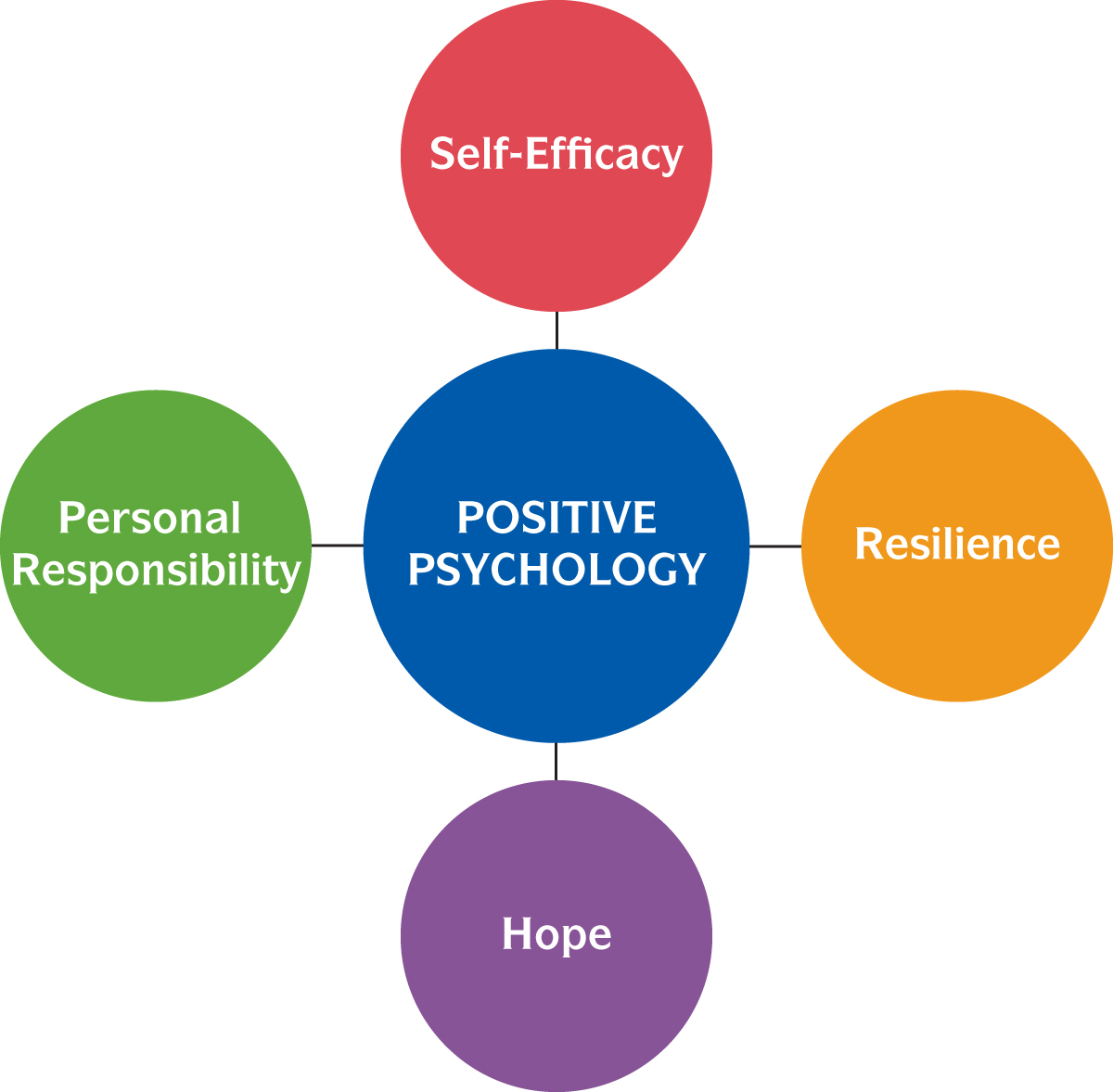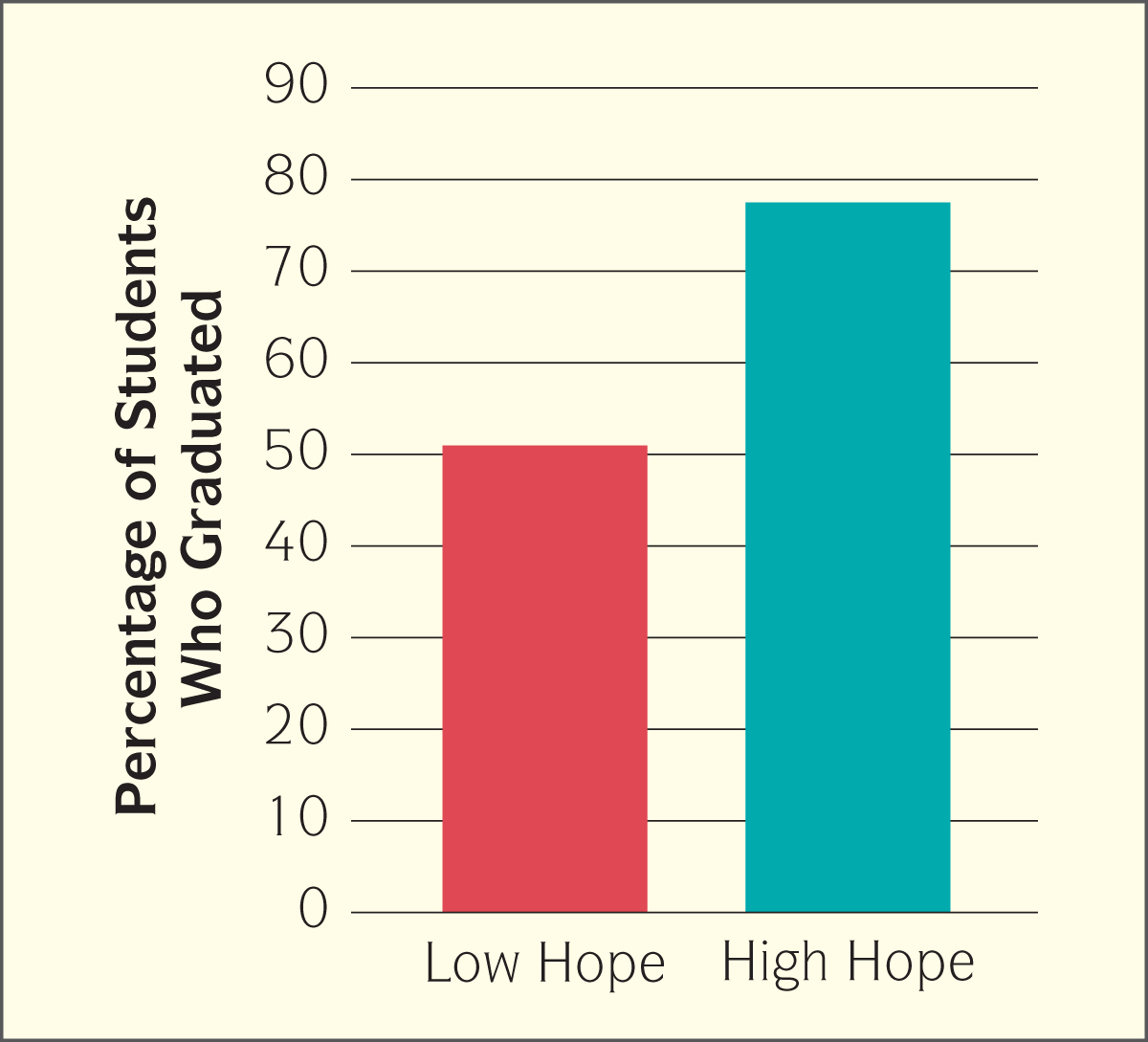Stay Positive, Even When It’s Tough
9

Have you ever heard the song “Happy” by Pharrell Williams? If so, you may know that it’s about deciding to be happy, rather than letting negativity bring you down. The song has resonated with many people — not only because it’s a catchy tune but also because the lyrics touch on an important concept: the power of positivity. If you maintain a positive attitude, you’re more likely to achieve your goals and lead a fulfilling life.
ACTIVITY: Ask students to bring to class a picture of someone or something that makes them happy. Have them explain why they selected that image. Take the activity to the next level by creating a happiness feed on a social media site such as Tumblr. Invite students to post items that make them happy throughout the term and to comment on one another’s posts.
The idea that positivity can lead to success forms the foundation of positive psychology, a branch of psychology that focuses on people’s strengths rather than on their weaknesses and that views weaknesses as growth opportunities.8 Positive psychology has become a major influence in educational and workplace settings, and it plays an important part in this book.
Positive Psychology: A branch of psychology that focuses on people’s strengths rather than on their weaknesses and that views weaknesses as growth opportunities.
The positive psychology movement emphasizes four central concepts: self-efficacy, resilience, hope, and personal responsibility (see Figure 1.1). All four will play a large role in your academic and professional success.
FURTHER READING: Explore www.gretchenrubin.com, a Web site from the author of The Happiness Project. Each day Gretchen posts a new blog tackling topics such as setting goals and making and breaking habits. She gives concrete ideas on how to hold ourselves accountable, achieve our goals, and increase our happiness.
Build Self-Efficacy
Self-efficacy is your belief in your ability to do the things required to achieve your goals. Students with a stronger sense of self-efficacy perform better on tasks and persist in those tasks even when things get rough. But not all self-efficacy is created equal. Self-efficacy works best when it’s based on a realistic assessment of your skills and abilities — and on evidence from your past performance, such as grades and instructor feedback. If your sense of self-efficacy is based more on self-deception than on evidence from your actual experiences, it can be overinflated. That can be dangerous: If you don’t live up to your own expectations of yourself, you could experience a painful “reality check.” But you also don’t want to underestimate your skills and judgment. If you lack confidence in your ability to do something you’re actually good at, you probably won’t perform your best.
FURTHER READING: Martin Seligman, Ph.D., is a leader in the field of positive psychology and a professor at the University of Pennsylvania. Visit the Web site Authentic Happiness (www.authentichappiness.sas.upenn.edu), to find further research and activities related to positive psychology.
Many students arrive at college with a strong sense of self-efficacy, only to have it shaken by poor grades or unexpected setbacks. For instance, Kathleen went to a small high school, where she easily got straight A’s and graduated near the top of her class. She enrolled in a large college and quickly discovered that it was much harder to stand out as an excellent student in such a large population and that the courses were much more challenging than in high school. She got some B’s and even a C in her first-term classes and started asking herself, “Can I really succeed in college?”
10
If you have similar experiences, understand that they can present you with valuable learning opportunities. Use those opportunities to turn setbacks into success. For example, if you do poorly on your first accounting test, don’t think of it as a failure; think of it as a starting point for improving your performance. How did you study for the exam? Did you complete all the practice problems at the end of each chapter or find a tutor? If not, would it be worth taking those steps for your next exam? Use learning opportunities like this to develop realistic self-efficacy beliefs and to improve your future performance.
WRITING PROMPT: Have students think of a time when they made a significant mistake. Invite them to reimagine the experience, but this time with a successful outcome. What did they do differently this time? What can they learn from this, and how can they apply it to the next difficult situation?
Be Resilient

Have you ever known someone who went through a rough patch in life but came out of the experience stronger and more driven to succeed? Perhaps you have a friend who was devastated when she lost her job but turned things around by getting support from her family, obtaining financial aid, and going back to school to train for a new career. Or maybe you know someone who suffered from workload “shock” during his first college term but got help from his adviser and instructors and ended the term with strong grades and a better approach to time management. Both of these people displayed resilience, the ability to cope with stress and setbacks.9
Resilience: The ability to cope with stress and setbacks.
ACTIVITY: Break the class into groups. Have each group create a top ten list of stress triggers (like tests, breakups, and money woes, etc.) and brainstorm ways to deal with these stressors. Ask each group to present to the class its top ten list of triggers and possible solutions.
College students often face challenges, and between balancing academic work and personal responsibilities, at times you may find yourself stressed out or overwhelmed. During these times, you can demonstrate resilience by getting support and making positive changes. If you receive a D on a biology exam, for example, you can use the experience to improve your study strategies for future exams. Resilience helps you manage challenges, big and small, and stay motivated to achieve your goals.
FOR DISCUSSION: Ask students to name someone they admire who has overcome adversity. How has this person shown resiliency? If this person hadn’t been resilient, how might things in his or her life be different?
Keep Hope Alive
Hope is the feeling that you can achieve your goals and that events will turn out for the best. Hope is strong when you have realistic self-confidence and a goal that you’re motivated to achieve — one that’s personally relevant to you. Charles Snyder, a specialist in positive psychology, offers another definition of hope: “the sum of the mental willpower and waypower that you have for your goals.”10 Willpower is the mental energy that drives hopeful thinking — the sense that through focus and motivation you can create a positive outcome. Snyder sometimes refers to willpower as agency. Waypower is having resources and plans — sometimes referred to as pathways — to achieve the positive outcome you believe in. For example, suppose you’ve always wanted to be a veterinarian. You know that getting into a school that awards a doctorate of veterinary medicine is tough — there’s a lot of competition for the few schools that offer this degree. You used your willpower to research colleges that offer a pre-veterinary curriculum through a department of animal science, and you applied to several schools and got accepted at one of your top choices. Your waypower enabled you to take this first major step toward the career of your dreams. That waypower includes critical resources like the time and energy you expended to research possible colleges, as well as your ability to learn about and apply for financial support to help pay your college tuition.
11
According to Snyder, it’s not enough to believe that good fortune awaits us. We also need a plan and the skills to make that good fortune become real. In other words, we have to transform our thoughts and intentions into actions, a process that you’ll have many opportunities to practice throughout this book. For more on the benefits of hope, see the Spotlight on Research.
HOPE PROMOTES ACADEMIC SUCCESS IN COLLEGE
spotlight onresearch
When it comes to success in college, your intelligence and academic ability are only part of the equation. In a study published in the Journal of Educational Psychology, researchers demonstrated that hope was also an important element of student success.

The researchers followed more than two hundred students from their first year of school through graduation. They measured levels of hope when the students entered college and then examined student grade point averages, college dismissal rates because of poor grades, and graduation rates over the next six years. The researchers discovered the following:
Students with lower levels of hope were dismissed from college at a rate three times higher than were students with high levels of hope.
Students with high levels of hope graduated at a much higher rate than did those with lower levels of hope.
This research suggests that hopeful students can identify their goals (such as graduating from college) and stay focused on pursuing them. Hope allows you to roll with the punches and achieve the goals that have meaning for you.
THE BOTTOM LINE
Being hopeful can help you focus on the positive and stay motivated to keep working toward your goals.
REFLECTION QUESTIONS
Question 1.1
1. What goals do you look forward to achieving this term? Are they related to your academic performance, your performance at work, or something more personal?
Question 1.2
2. How hopeful are you about achieving these goals? Rate your hopefulness on a scale from 1 to 10, with 10 being “extremely hopeful” and 1 being “extremely lacking in hope.”
Question 1.3
3. What actions can you take to become hopeful, strengthen your hopefulness, or remain hopeful about achieving your goals?
C. R. Snyder, H. S. Shorey, J. Cheavens, K. M. Pulvers, V. H. Adams III, and C. Wiklund, “Hope and Academic Success in College,” Journal of Educational Psychology 94 (2002): 820–26.
Take Personal Responsibility for Your Success
Positive psychology is about personal responsibility — taking charge of defining your goals, creating plans for accomplishing them, and seeking out resources that can help you achieve them. Personal responsibility gives you control: You have the power to turn negative results into positive ones by treating disappointments as learning opportunities. After all, most of your instructors aren’t going to approach you and say, “I see you got a bad grade on the exam; here’s what I think you should do about it.” It’s up to you to come up with strategies for doing better on the next exam. You’ll get a chance to think about this topic more fully later in the book, but for now, just remember: When it comes to your success, you’re the boss.

12